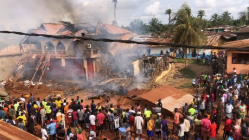Liberian Journalist urges UN to safeguard Media Freedom and Digital Rights

Liberian journalist and media development practitioner Wremongar Joe has presented three key recommendations to United Nations member states during the ongoing pre-sessions of the Universal Periodic Review (UPR) in Geneva, Switzerland.
The UPR info organizes the UPR pre-sessions.
The UPR Pre-sessions are meetings held by the UPR info that bring national human rights institutions (NHRIs) and civil society organizations (CSOs) together with Permanent Missions (the diplomatic representations of UN Member States) to discuss the human rights situation in a country before it is reviewed by the UN’s Universal Periodic Review (UPR) Working Group.
The main goal is for CSOs and NHRIs to provide first-hand information and context to diplomats, ensuring that recommendations made during the actual UPR accurately reflect the realities on the ground and address key human rights issues.
Speaking on behalf of the Center for Media Studies and Peacebuilding (CEMESP) at the UN in Geneva on Tuesday, Joe, a program officer, urged the international community to press Liberia to strengthen its democratic governance by adopting critical media and digital rights reforms.
“Liberia urgently needs comprehensive internet freedom, data protection, and cybersecurity laws,” Joe said.
“We also need an independent broadcast regulator, and the transformation of state radio into a genuine public service broadcaster that serves all Liberians, not just the government of the day.”
Joe also raised concerns about limited transparency and accountability in public institutions. Despite Liberia’s Freedom of Information Act being enshrined in law, he said public officials frequently ignore requests from journalists and citizens seeking access to spending records and concession agreements.
“The Freedom of Information Act exists in theory but is often undermined in practice. Too many ministries and agencies simply refuse to release contracts or provide public data. This must change if Liberia is to build a culture of transparency,” he emphasized.
A third area highlighted was press freedom and the safety of journalists. Joe pointed to a pattern of harassment, intimidation, and criminal prosecution of media workers in Liberia.
“Journalists should not be treated as criminals for doing their job,” Joe stressed. “Ending harassment and politically motivated prosecutions is critical to ensuring that Liberia remains a democracy where dissenting voices are respected.”
He told the UN session that while progress has been made since the adoption of the Kamara Abdullah Kamara (KAK) Act of Press Freedom in 2019, which decriminalized certain speech offenses, the reality is that many reporters and activists remain vulnerable to surveillance and intimidation.
“Real change will require more than new laws. It demands political will and a sustained commitment to protect citizens’ rights both online and offline,” he noted.
On the sidelines of the pre-sessions, Joe has been engaging in bilateral meetings with representatives of UN permanent missions in Geneva, including Belgium, Japan, and others, to help build support for the recommendations.
He also expressed gratitude to the UK-based Small Media Foundation, which sponsored his trip to Geneva.
He thanked the foundation for supporting and covering all costs of his travel, including technical assistance, and for its longstanding partnership in advancing media freedom and digital rights in Liberia.



















